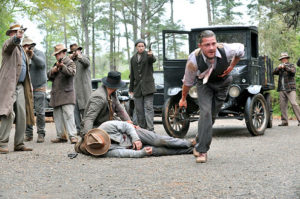New Prohibition-era crime drama, “Lawless,” should have been an excellent film. It certainly has a lot going for it. For starters, the film has an eminently talented director in Australia’s John Hillcoat––this generation’s answer to Sam Peckinpah––who possesses a masterful grasp of desolate locales, hardened people, and brutal violence (see 2005’s harrowing western “The Proposition,” the best––and bleakest––that genre has offered since the 1992 release of Clint Eastwood’s “Unforgiven;” or check out his sparse, disturbing 2009 adaptation of Cormac McCarthy’s post-apocalyptic novel, “The Road”).
Joining Hillcoat is his frequent collaborator, writer/musician Nick Cave (of ‘Nick Cave and the Bad Seeds’ fame), adapting the best-selling historical novel by Matt Bondurant, “The Wettest County in the World.” Finally, the film boasts a solid cast, featuring the likes of Gary Oldman, Guy Pearce, and Jessica Chastain. Somehow, these pieces fail to fit together harmoniously, and we are left with a flawed, frustrating film that still manages to offer some utterly compelling moments.
“Lawless” chronicles the mostly-true story of the Bondurant clan (direct relations of the novel’s author) and their profitable bootlegging operation in Franklin County, Virginia. Brothers Forrest (Tom Hardy) and Howard (Jason Clarke) run the outfit, while younger brother Jack (Shia LaBeouf) is stuck sweeping the family saloon. With the sheriff on the take, the operation runs smoothly, until Special Deputy Charlie Rakes (Pearce) is brought in from Chicago to clean the county up.
The brutal Rakes assaults Jack in order to send a message, but the laconic, uncompromising Forrest refuses to back down, setting off an acrimonious conflict. Meanwhile, Jack is desperate to prove his worth to his big brothers and anxious to catch the eye of the preacher’s pretty daughter, Bertha (Mia Wasikowska), but his brash decisions just might doom the family business. Throw in a stately former dancer running from her past (Chastain) and a mobster with an itchy trigger-finger (Oldman), and the stage is set for an explosive showdown between the moonshiners and the law.

One of the film’s major letdowns is Jack’s status as the central figure. Part of this is down to the writing, and part can beblamed on the casting and performance of Shia LaBeouf. Jack’s character arc, from bumbling youngster to an ostensibly seasoned and responsible member of the business, never really comes to fruition. It’s hard to root for Jack, because he makes flagrantly poor decisions time and again, but never seems to learn the lessons that Forrest tries to impart. LaBeouf’s portrayal of Jack is also excessively one-note, making the character uniformly whiny and unlikable for the duration. Further, despite Jack’s utter lack of evident self-reflection, he’s given a lengthy closing voice-over that doesn’t mesh with what we’ve seen of him on-screen.
The other performances vary wildly from the bizarre to the commendable, leaving many of the frequent dialogue-heavy scenes feeling uneven and unfinished. Gary Oldman’s role is quite small (he has dialogue in only one short scene) and his prodigious talent seems squandered on a one-dimensional character. Guy Pearce is perhaps the most memorable as the prissy-but-savage lawman, but his performance is unnatural and quite over-the-top, even approaching caricature. His lurid lack of restraint is certain to be branded genius by some, but most viewers are likely to find that he pulls them out of scenes. Tom Hardy is passable in a role that seems tailor-made for his brand of gruff, wordless physicality, and the relatively-unknown Jason Clarke turns in a fine, understated performance as the simple, obedient Bondurant brother.
Fans of gangster films like “Goodfellas” and “Casino” may find the setting of the relatively-untapped Prohibition era to be somewhat dry, but when the film works best, as it hurtles inexorably toward the next explosive conflict, it can be absolutely gripping. Even as a mere scrap of historical Americana, “Lawless” is worth watching––if you can stomach the brutality.
– by Demian Morrisroe